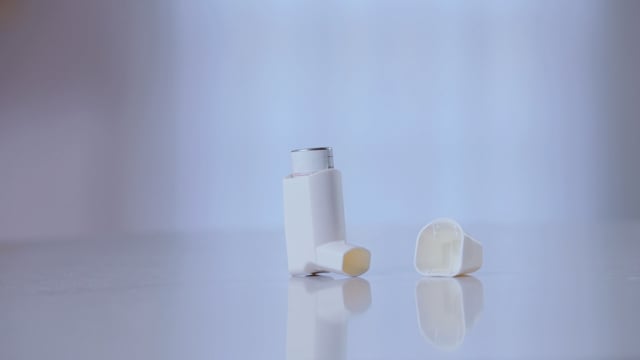- Parents Home
- Para Padres
- A to Z Dictionary
- Allergy Center
- Asthma
- Cancer
- Diabetes
- Diseases & Conditions
- Doctors & Hospitals
- Emotions & Behavior
- First Aid & Safety
- Flu (Influenza)
- Food Allergies
- General Health
- Growth & Development
- Heart Health & Conditions
- Homework Help Center
- Infections
- Newborn Care
- Nutrition & Fitness
- Play & Learn
- Pregnancy Center
- Preventing Premature Birth
- Q&A
- School & Family Life
- Sports Medicine
- Teens Home
- Para Adolescentes
- Asthma
- Be Your Best Self
- Body & Skin Care
- Cancer
- Diabetes
- Diseases & Conditions
- Drugs & Alcohol
- Flu (Influenza)
- Homework Help
- Infections
- Managing Your Weight
- Medical Care 101
- Mental Health
- Nutrition & Fitness
- Q&A
- Safety & First Aid
- School, Jobs, & Friends
- Sexual Health
- Sports Medicine
- Stress & Coping
What's the Difference Between a Nebulizer and an Inhaler?
Asthma medicine needs to get into your lungs to work, but do you know how it gets there? Inhalers and nebulizers — that's how! Your doctor will tell you which device is best for you.
What's a Nebulizer?
Nebulizers are electric- or battery-powered machines that turn liquid asthma medicine into a fine mist. This mist comes through a tube that is attached to a mouthpiece or face mask. (A face mask is a kind of plastic cup that covers the mouth and nose.)
Nebulizers are easy to use because there isn't much to do — just place the mouthpiece in your mouth or the mask over your nose and mouth, and breathe in the medicine. But nebulizers take at least 5 or 10 minutes to get the medicine into the lungs and sometimes even longer. They can be big and noisy and aren't always easy to carry around.
What's an Inhaler?
Inhalers are little devices that can fit in your hand and are small enough to carry in a backpack, purse, or pocket. There are different types of inhalers:
- Metered dose inhalers (MDI) are the most commonly used. Like little aerosol cans, these inhalers push out a spray of medicine.
- Dry powder inhalers deliver medicine in powder form, but it does not spray out. The person must do more of the work by inhaling the powdered medicine quickly and deeply.
Dry powder inhalers can be a little easier to use than metered dose inhalers, which are sometimes tricky. With practice, kids get very good at using inhalers. The best way to use an MDI properly is by using it with a spacer.

Using a Nebulizer
Learn step-by-step how to use a nebulizer for asthma.

Using a Dry Powder inhaler
Learn step-by-step how to use a dry powder inhaler for asthma.

Using an Inhaler With a Spacer
Learn step-by-step how to use an inhaler with a spacer for asthma.
What's a Spacer?
A spacer makes it easier to get medicine into the lungs when using an MDI. It attaches to the inhaler and puts the medicine into a kind of holding chamber.
From that chamber, you can breathe the medicine in slowly.
Without a spacer, medicine from the inhaler can get stuck at the back of the throat instead of getting to the lungs. A spacer helps get the medicine into the lungs, so it can start working on breathing problems.
During an office visit, your doctor might ask you to take a puff from your dry powder inhaler or your MDI with spacer. The doctor wants to watch you take your medicine to make sure you're comfortable doing it.
What Else Should I Know?
Learn how to use the device your doctor recommends so you get the medicine into your lungs. Taking your asthma medicine the right way can prevent flare-ups and keep a flare-up from getting really bad if it does happen.

© 1995- The Nemours Foundation. KidsHealth® is a registered trademark of The Nemours Foundation. All rights reserved.
Images sourced by The Nemours Foundation and Getty Images.

